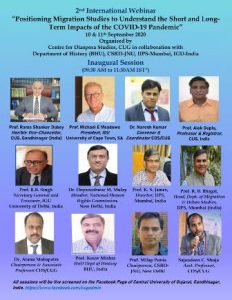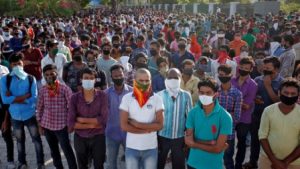COVID-19 Pandemic and Positioning Migration Studies
A paradigmatic shift is needed and will be needed to study diaspora and migration, especially after the COVID-19 pandemic.
The whole world is facing an unprecedented crisis induced by the COVID-19 pandemic. These crises leave their short and long-term impact on various spheres of society,  particularly on internal, international migrants or diaspora. India has the largest diaspora (31.2 million as per the Ministry of External Affairs, Government of India) population or international migrants (17.5 million or 6.4 per cent, IOM) living abroad followed by Mexico and China. On the other side, India has also significant internal migrant population, who are basically circular/seasonal/temporary, which constitutes about 10 million.
particularly on internal, international migrants or diaspora. India has the largest diaspora (31.2 million as per the Ministry of External Affairs, Government of India) population or international migrants (17.5 million or 6.4 per cent, IOM) living abroad followed by Mexico and China. On the other side, India has also significant internal migrant population, who are basically circular/seasonal/temporary, which constitutes about 10 million.
The Centre for Diaspora Studies organised the second international webinar on Positioning Migration Studies to Understand the Short and Long-Term Impacts of the COVID-19 Pandemic at the Central University of Gujarat (CUG), Gandhinagar, India, in collaboration with five eminent institutions namely the Banaras Hindu University (BHU), CSRD-Jawaharlal Nehru University, IIPS-Mumbai, and IGU-India on 10 and 11 September 2020.This garnered much interest and the Centre received around 4000 registered participants online from India and different parts of the world.
Dr Atanu Mohapatra, Chairperson, CDS/CUG recounted many government policies and programmes initiated by the Government of India for the benefit of the migrants, immigrants and diaspora who are living in and outside India. Prof. Keshav Mishra, head of the Department of History, (BHU) has emphasised on the importance of history and its involvement in migration studies, particularly during the pandemic like COVID-19. Prof. Milap Punia, Chairperson of CSRD-JNU, New Delhi, drew the attention towards a lack of proper data and their analysis, when it comes to the study of disasters and pandemics in India and also the different ways in which COVID-19 has affected migrants—be it economic, livelihood, food security, other physical and mental difficulties.
COVID-19, Migrants and Challenges to India’s Economy
Prof. R.B. Singh (IGU- Secretary-General) recounted the various pandemics that India had previously dealt with and how difficult it is for the country to deal with COVID-19 as it is much more widespread and far-reaching. He looked at the opportunities that can be created from this pandemic in the fields of manufacturing and the need reforms in labour and migration and the importance of focusing on these avenues for the government.
Dr Dnyaneshwar M. Muley (Member NHRC, Delhi) focused on the difficulties that led to the migrant exodus and the need for policymaking and government infrastructures to meet sustainable development goals.
It is important to get proper data to make good policies, and migrant studies become very important in this scenario where internal migrants moved in large numbers.
Also Read : Migration: How to Minimise the Adverse Drivers?
H.E. Arun Kumar Sahu (Special Guest, High Commissioner of India to Trinidad and Tobago) touched upon the various difficulties that COVID-19 put in front of nations all over the world and challenged the existing strides made.
Reliability of Migration Data
Prof. James, Director and Senior Professor, IIPS-Mumbai, stated that generally during the outbreak of pandemics, attention is given to mortality studies or health issues. One of the policies, which we need to suggest to Government of India, is that it is important to start counting migrants, which is quite possible, as there are a lot of technological improvements.
Prof. R.B. Bhagat, IIPS-Mumbai, focused on the issues of governance and policymaking about the pandemic. Migrants’ connect between two places play a crucial role in developing both the places. He emphasised, how space and place matter in the process of migration and how space and place are changing through human intervention, which can be inclusive or exclusive, or people friendly. Economic and social opportunities with space and time are shaped by the migrants. COVID-19 pandemic has been affecting more largely the short-term migrants those are working in the urban informal sector and are not the vote banks of the destinations areas.
Vande Bharat Mission and Aatma Nirbhar Bharat
Prof Rama Shanker Dubey, Vice Chancellor, CUG, in his presidential address shared on the history of migration from India and Gujarat. He brought attention to the issues of family reunification, students stranded abroad, diaspora and other problems due to the economic slackening because of the pandemic. He also dwelt upon the Government of India’s various steps to mitigate the difficulties due to the COVID-19 and to assure the safety and security and livelihood of many Indians in general and particular to migrants living in India and diaspora abroad, through the missions like Vande Bharat Mission and Aatma Nirbhar Bharat or Self-reliant India. Further, he recalled the COVID package of the honourable prime minister Narendra Modi, who announced the roll out of the Rs 20 lakh crore (265 billion USD) for economic reform.
Migration, Diaspora, Remittances and Economy
Prof. Binod Khadria from JNU while speaking on “Understanding Impact of COVID-19 on South Asian Economics through the Lens of Migration” provided an overall view on the South Asian economy and impact of COVID-19. He explained some of the South Asian Countries like Afghanistan, Bangladesh, Bhutan, India, The Maldives, Nepal, Pakistan and Sri Lanka, face many problems due to COVID, due to their stringency levels, lockdown measures and their travel restrictions.
Dr Sonia Plaza, Senior Economist, World Bank, shared about the reduced flow of remittances and how they are drastically affected by COVID-19 and the migrant stock. Dr Plaza suggested that mobile data or social big data might be used, but it is inconsistent and cannot be fully reliable. Prof Anuradha Banerjee from JNU argued on “The Exodus in Times of Pandemic: Mobility, Migration, and Livelihood of Informal Migrant Workers during COVID-19 Crisis in India”. She stressed on internal migrants and their sufferings due to the pandemic and the heightened mobility as a result of the sudden lockdown.
Migration, Diaspora and Pandemic: Historical and Current Scenario
Rajeshwari Chandrasekar, UNICEF, India drew attention to the condition of children of migrants and the pravasi versus desi migrants. Prof Binda Paranjape from BHU stressed on the importance of studying multiple voices and narratives to know the full story of the pandemic. Prof K.C. Das, IIPS-Mumbai, focused on the lack of proper data in India, and especially in the case of COVID-19, migration and diaspora.
Migration and Diaspora Engagement: Best Practices
Prof. Atanu Bhattacharya (SLL&CS/CUG).Prof. M.K. Gautam (University of West and East, The Netherlands) drew attention towards many different diasporas of India and their relationship with India and how it varies from  generation to generation. They also pointed out the paradigmatic shift that is needed and will be needed to study diaspora and migration, especially after the COVID-19 pandemic. Prof S. Irudaya Rajan, Centre for Development Studies (CDS), Kerala, drew attention to migrant engagement by the Indian government and how it failed its migrants. He also highlighted the importance of returnee migrant’s rehabilitation. Prof Anand Singh, University of Kwazulu-Natal, South Africa, described the condition of migrants and diaspora in South Africa. He focused on the Indian diaspora in South Africa during the pandemic. H.E. Arun Kumar Sahu, High Commissioner of India to Trinidad and Tobago spoke about the actions taken by him and the Government of India to repatriate Indian migrants back to India and the issues of inter and intra-governmental organisations.
generation to generation. They also pointed out the paradigmatic shift that is needed and will be needed to study diaspora and migration, especially after the COVID-19 pandemic. Prof S. Irudaya Rajan, Centre for Development Studies (CDS), Kerala, drew attention to migrant engagement by the Indian government and how it failed its migrants. He also highlighted the importance of returnee migrant’s rehabilitation. Prof Anand Singh, University of Kwazulu-Natal, South Africa, described the condition of migrants and diaspora in South Africa. He focused on the Indian diaspora in South Africa during the pandemic. H.E. Arun Kumar Sahu, High Commissioner of India to Trinidad and Tobago spoke about the actions taken by him and the Government of India to repatriate Indian migrants back to India and the issues of inter and intra-governmental organisations.
Migration, Urbanisation and Marginalization
Sajaudeen Chapparban from CDS/CUG highlighted issues faced by internal migrants and refugees in India during the COVID-19 pandemic. Prof. Anisur Rehman, Director-HRDC, JMI argued that the weaker section population benefitted both socially and economically through the migration process.
Prof. Gerise Herndon from Nebraska Wesleyan University, USA, highlighted the existing inequalities and xenophobia in the US and its treatment to refugees and migrants that were more exposed and vulnerable during the pandemic.
Also Read : Migration, Migrants and the Right to the City
Migration Policies, SDGs and Managing the Future Mobility
Prof Archana K. Roy, IIPS-Mumbai, shared the challenges to migrant labour in the pandemic and future actions and possibilities. Dr Paiman Ahmed, University of Raiparin, Iraq, focused on the SDG sand migration and poverty, and how they will be affected by the pandemic. Prof. Bhaswati Das, JNU, focused on the movement of migration and labour and the challenges faced during the lockdown.
Priority Areas of Research and Analysis
Prof Rama Shankar Dubey, Vice-Chancellor, CUG, chaired the valedictory session and it was moderated by Prof. Binod Khadriafrom JNU. Dr. Marie McAuliffe, Head (Migration Research Division) IOM, Chief Editor of World Migration Repot, UN Migration, Geneva, Switzerland, addressed on “COVID-19 and Global Transformations of Migration and Mobility: Initial Reflections and Priority Areas of Research and Analysis”. She said that pandemic is a systematic geopolitical event that has transformed migration and mobility systems globally. Initial research and analysis show that the most vulnerable in society are most affected by COVID-19. This includes migrants (including refugees) in different settings. She has broadly categorised COVID-19 impacts on migrants into three: a) Immediate Impacts:by the end of May, the majority of countries globally continued to have some form of COVID-19-related travel restrictions such as partial international border restrictions, then total restrictions, and internal restrictions (now slightly easing); b) Medium-term Impacts: International remittances are projected to fall by 20 per cent in 2020. COVID-19 has been devastating for millions of migrant workers, many of whom are unable to work due to lockdowns, movement restrictions, or job losses; c) Long-term impacts of COVID-19 include reduced access to education in developing countries, urbanisation, and city-to-city migration will be intensified making cities the centre for global migration and mobility systems, etc.
